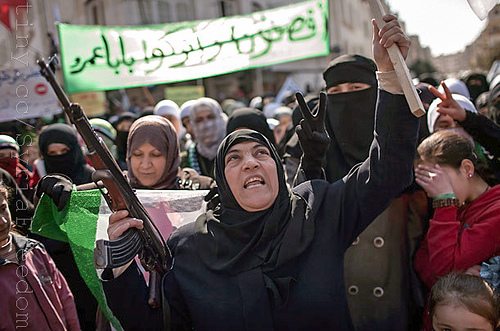

Environment
Water becoming ‘a tool of conflict’ in Syria and Iraq
The fate of the conflicts in Iraq and Syria could be decided by one of the world’s most important resources – water – security experts have said.
The two countries, like much of the Middle East, frequently suffer from water shortages. Scientists fear that climate change will cause ever more severe droughts, which could exacerbate tensions and conflict in the region.
Speaking to the Guardian, Michael Stephen, deputy director of the Royal United Services Institute thinktank in Qatar, explained that in this context, control of water supplies is crucial.
“Water is now the major strategic objective of all groups in Iraq. It’s life or death. If you control water in Iraq you have a grip on Baghdad, and you can cause major problems. Water is essential in this conflict,” he said.
The forces of the Islamic State in Iraq and Syria (ISIS), who now battle for control of Iraq, have form for using water as a weapon. Earlier this year they used a captured dam on the Euphrates to cut off water supplies for hundreds of thousands of people, while flooding the surrounding area.
As ISIS forces advance towards the larger Haditha and Mosul Dams, it is feared much greater damage could yet be done.
“Rebel forces are targeting water installations to cut off supplies to the largely Shia south of Iraq,” said Matthew Machowski, a Middle East security researcher for the UK parliament and the Queen Mary University of London.
“One could claim that controlling water resources in Iraq is even more important than controlling the oil refineries, especially in summer. Control of the water supply is fundamentally important. Cut it off and you create great sanitation and health crises.”
In Syria too, both sides have been accused of using water strategically to their advantage. Water shortages have even been identified as a major driver of the long-running conflict.
“The events that have unfolded in Syria over the past few years stem from a far more complex set of pressures, beyond religious tension,” Aled Jones, director of the Global Sustainability Institute at Anglia Ruskin University told Blue & Green Tomorrow.
“A prolonged drought led to internal migration from rural to urban communities which, coupled with high international prices for food, increased social tension that was then confronted with government brutality.
“This is worrying as population increases and industrialisation alongside decreasing water availability, that is likely to be further exacerbated by climate change, is a systemic risk across the Middle East and North Africa.
He added, “In the future water availability will not only be an increasing source of political instability but also a tool of conflict, as we are now seeing in Iraq.”
Beyond the two troubled nations, military and security experts also fear that similar climate impacts will act as a catalyst for conflict and a trigger for terrorism.
One recent report from a panel of former American generals and admirals warned that droughts – caused by global warming – are leading to conflicts over food and water in the Middle East and Africa, exacerbating pre-existing divides and creating an environment in which extremism and revolutionary influences can prosper.
Photo: Freedomhouse via Flickr
Further reading:
Oil prices peak as conflict in Iraq escalates
Climate change a ‘catalyst for conflict’
Renewables the solution to UK’s critical fossil fuel shortage – report
Climate change may have contributed to Syrian civil war
Water and food shortages at the root of the Syrian crisis, claims study


 Environment12 months ago
Environment12 months agoAre Polymer Banknotes: an Eco-Friendly Trend or a Groundswell?

 Features11 months ago
Features11 months agoEco-Friendly Cryptocurrencies: Sustainable Investment Choices

 Features12 months ago
Features12 months agoEco-Friendly Crypto Traders Must Find the Right Exchange

 Energy11 months ago
Energy11 months agoThe Growing Role of Solar Panels in Ireland’s Energy Future




























